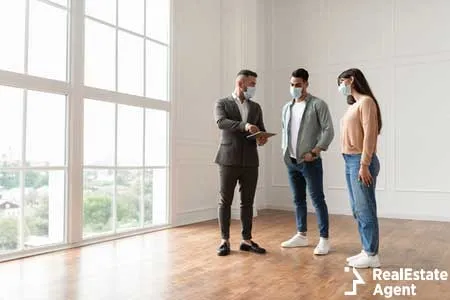
At the beginning of 2020, a pandemic swept across the globe. The coronavirus or SARS CoV-2 became public enemy number one due to its unpredictability in spreading and affecting human health. Specialists soon discovered the exponential damage it can exert causing respiratory tract infections, from mild to lethal.
As a result of the virus, a series of protective measures were introduced to stop spreading the sickness and in an effort to keep COVID-19 out of your home. These preventive actions hit the global economy hard, leading to many people losing their jobs, businesses going bankrupt, or simply freezing any form of normalcy.
Introduction to the effects of the 2020 pandemic
The ensuing lockdown meant another heavy blow to the weakened economy forcing many participants to reconsider their previous stand on handling business. Losses still can not be fully assessed in several US areas, which were hit the hardest economically. In short, we become acquainted with such terms as a decline in consumerist spending power, stay-at-home restrictions, working from home, leave of absence from the workplace, and massive-scale layoffs.
Consequently, people preferred having hard cash in their pocket to any investment. Financial security became a priority above all prospects. Hence, the economy came to a standstill.
In other words, the pandemic hit the pause button. Contrary to other financial crises, experts did not opt for stock market bargain sales in America. For a change, they remained watchful of how the events would play out before they spent capital on assets like properties and buildings.
The prosperous US housing market during the pandemic
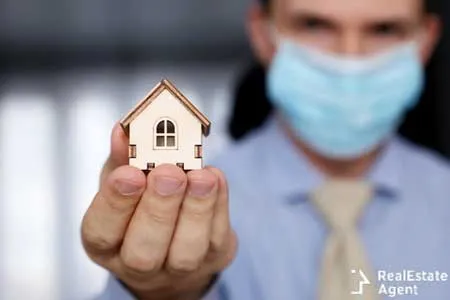
The US real estate market had its ups and downs, for sure. One of them being the American real estate bubble burst in 2008. Therefore, many Americans came to the shocking conclusion that their home became less valuable. As a response, several enticing programs were introduced over the upcoming 10 years. The government was giving out stimulus checks, which helped people financially. Housing prices bounced back from their lows during the economic crisis. In many cases, home values even topped their 2006 highs achieving a constant growth of 70 percent across the nation.
Now, facing the pandemic, the housing business followed a similar trend: let’s wait out the aftermath. At first sight, low mortgage rates and an overall confident consumer attitude contributed to a rising interest in purchasing new real estate. And soon, this resulted in the emergence of cities where real estate was booming during the pandemic.
Let’s see to what extent the housing market became an even more challenging one. Logically, the absence or the partially missing house income should have had a discouraging effect on demand for homes. In addition, government decrees such as stay-at-home and social distancing should have influenced home seekers not to go house hunting. At the same time, sellers kept their distance from listing their real estate and chose to keep interacting with possible clients to a minimum. Despite all these facts, the US housing market reported substantial growth during this period. One such example is the Miami housing market breaking records.
In a nutshell, there was a shift in mentality in most US citizens during the year. Home leaving restrictions did not impress them at all. Soon they jumped at the conclusion to leave the metropolitan area behind and buy a home in a more rural region with more free space of their own. Their input led to an increase in demand for private property. In addition, many Americans realized that their homes weren't too pandemic-friendly and decided to move to cities with fewer restrictions. They decided to purchase a home with more pandemic-friendly amenities ....even if it meant just a balcony to step out on and get fresh air.
However, there were not enough listed houses on the market. The number of available homes dropped approximately 53 percent nationwide in 2020 compared to 2019. As a consequence, low supply boosted house prices.
The pandemic re-ordered real estate markets
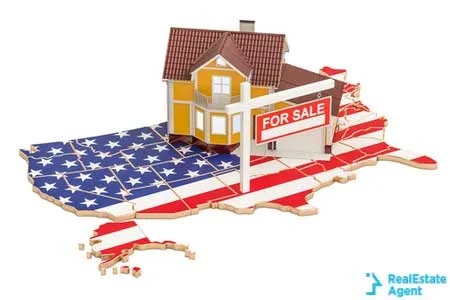 Another complex outcome of the coronavirus pandemic was a powerful trend in migration. On the one hand, people felt safer dwelling in the south or southwestern part of the States, where they can spend social distancing outside. A significant portion of firms and enterprises let employees work remotely. You can order every household item online, so why go back to retail shopping? On the other hand, the metropolitan lifestyle turned stale since all cultural venues were closed anyway.
Another complex outcome of the coronavirus pandemic was a powerful trend in migration. On the one hand, people felt safer dwelling in the south or southwestern part of the States, where they can spend social distancing outside. A significant portion of firms and enterprises let employees work remotely. You can order every household item online, so why go back to retail shopping? On the other hand, the metropolitan lifestyle turned stale since all cultural venues were closed anyway.
Instead of New York City, Washington, DC, Boston, or Philadelphia people would go to cities and counties considered initially too insignificant, too warm, or absent of proper amenities or culture. Smaller settlements suddenly found themselves at the top of the housing market lists.
Homebuyers desire more free space, more chilling neighborhoods, remote work, and access to outdoor activities. Therefore, Austin, TX, Phoenix, AZ, Nashville, TN, Tampa, FL, Jacksonville, FL, etc., took the top spots on the list of most desired towns in the US, leaving such cities behind like San Francisco, Boston, Cincinnati, etc.
COVID is speeding up statistical tendencies already present before the pandemic. A series of small towns and cities have now become available for big corporations offering pro-growth prospects, low-tax promises, and political security. In addition, they provide mega enterprises with an expert and highly motivated workforce even in more advanced fields such as mathematics, innovative technology, business, and medicine.
According to CoStar, “Austin, Salt Lake City, Raleigh, Charlotte, Nashville, and San Jose top the list in 2020 in this respect with occupied office growth expected to exceed 10% over the next five years.”
There is no single city in California, New York City, New Jersey, Honolulu, Chicago, or Philadelphia figure on these lists. Statistics demonstrate how America gave in to the so-called emotional migration away from expensive housing markets in cities characterized by heavy taxes, and frequent lockdowns.
A guide to real estate agents facing the COVID-19 pandemic
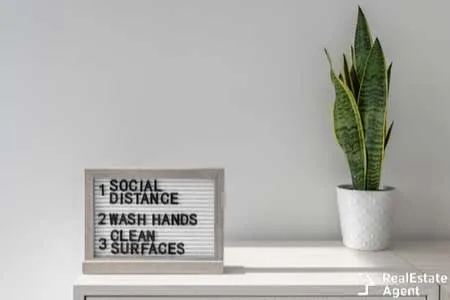
The National Association of Realtors issued the statement which revealed that real estate agents must adhere to required housing laws and policies during COVID-19. No discriminatory instances are allowed based on disability and national origin. Although the Fair Housing Act hasn’t yet determined whether the sickness constitutes a disability, treating infected individuals as citizens covered by federal disability protections is highly recommended.
In addition, “Realtors who choose to continue providing services during this time, have a legal obligation to make reasonable accommodations to assist or provide housing to individuals who have COVID-19 when able to do so without posing a threat to the health and safety to themselves or others.” (Source: Guidance for Fair Housing Compliance During the COVID-19, www.nar.realtor)
They must implement safety precautions protecting against both people infected with the virus and potential asymptomatic carriers. Generally speaking, major changes had to be introduced on how to sell a house during a pandemic.
The safety guidance published by the CDC (Centers for Disease Control and Prevention) recommends keeping a safe distance from everyone (applied both to clients and realtors) while wearing protective masks. In order to reduce the risks of infection, realtors are strongly endorsed not to bring potential clients to a house, where the owner is present. In addition, visitors and buyers should come to listed houses one at a time.
Everybody should maintain a six-foot distance and not touch surfaces. Additionally, realtors should clean the external parts of objects in a private property regularly. If feasible, choose virtual showings instead of personal presentations of homes.
When a real estate agent meets a client during the pandemic
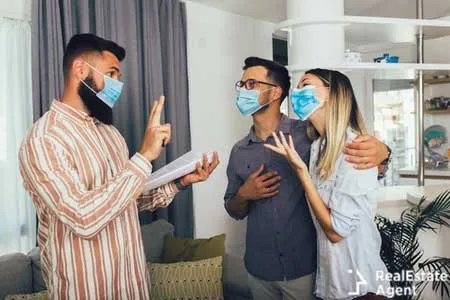
It is an excellent time to be a real estate agent virtually in the whole country, especially in the southern and western parts of America. Houses are in high demand in smaller towns/suburbs. Obviously, many things have changed in the business. Scheduling open houses and personal showings were labeled as significant health risks. Subsequently, virtual tours and 3D screenings turned into the most valuable and creative methods.
The responsibility of realtors is now similar to a psychologist’s: keep people calm and safe. On many occasions, they will draw clients’ attention to how to responsibly reshape the customers’ home life during pandemics.
Even nowadays, housing market negotiations are still a thing. In addition, real estate agents are active and continue to generate contracts. They tend to keep personal meetings to a minimum. Instead, realtors engage in interactive video showings. Another advantage of this technique, besides maintaining public health, is filtering the clientele. Therefore, only genuine buyers participate in such video presentations.
While in the past experts considered creating a lived-in atmosphere in houses, now homes are uninhabited, often a vanilla box as a new real estate trend. Practice confirms this theory: houses sell more quickly this way. Don’t get us wrong! Live house tours still happen.
Organizing such events, however, became a little bit of a nuisance. Extensive preventive measures are needed involving cleaning agents, disinfectant wipes to clean every surface, and often open windows to improve the air circulation.
Not to forget about constantly reminding the visitor to wear protective masks. The latter constitutes a significant disadvantage in the real estate business. Masks cover faces, and facial expressions. Realtors are no longer able to read the client’s mind and address eventual doubts regarding the purchase of real estate.
Everything about selling and buying a house is reduced to impersonal features. Set up a video choreographer, join Zoom, and invite the house hunters for an interactive, still detached video presentation via a live tour. The firsthand experience went missing since buyers can not touch, see and hear the real thing, just an indirect, “mapped” reality.
Another essential of this period is the limited number of available, listed houses. Interest rates are still low, and house hunters are now ready to purchase the perfect home. Nonetheless, many home sellers have decided to disengage and wait for better timing.
Once sellers are reluctant to actually sell, and the market stagnates, several realtors follow the same logic. Namely, to wait out the pandemic, and instead focus on maintaining relationships with their clientele. Realtors assumed the role of good family friends often drawing attention to keeping mental health during COVID. Or how to approach the upcoming holidays.
Prospects on the future of housing in America
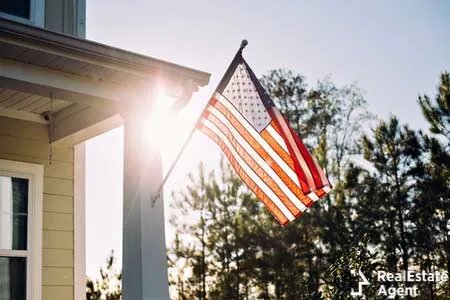
Although reaching pre-pandemic standards in the housing market, “normality” is still far away, there were positive signs, such as a stimulus package to avoid a housing crash again. In order to encourage Americans' ability to buy a new house, this plan has created a tax credit of $8,000 dedicated to first-time home purchasers. In addition, the wide distribution of Covid-19 vaccines provided a strong incentive to search for homes.
Now that the vaccines are here, real estate will take a turn for the better in 2021! Therefore, a strong belief in homeownership is enhanced, and we expect immense growth for the rest of the year.
Alpha and omega, the home has taken on an entirely distinct shape and connotation. You no longer eat, sleep in your home, but work in it as well. You work out, play with your children, and supervise their online education, and finally, you rest.
Consequently, picking the one that satisfies your needs just got more crucial than ever.
Final words? Always be ready to hit the road! COVID-19 is driving American south- and westwards in search of a more serene environment. Working by the pool became a priority for many. Just roll with the dice!
Since there is a new set of rules applied to the housing market, you must have plenty of questions! If you are interested in selling or purchasing a brand new home, please address your query or comment below! And don’t forget to share this article on your social media!
















Have a question or comment?
We're here to help.